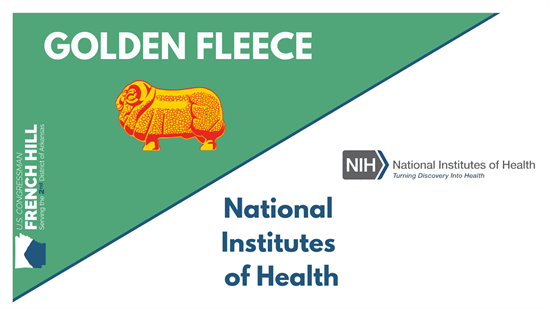RELEASE: REP. HILL AWARDS GOLDEN FLEECE TO THE NIH FOR FAILURE TO MONITOR AND ENFORCE GRANT REQUIREMENTS
WASHINGTON, D.C.,
February 27, 2023
WASHINGTON, D.C. – Rep. French Hill (AR-02) named the National Institutes of Health (NIH) as the latest recipient of his Golden Fleece Award for their lack of monitoring and enforcing the terms of grants awarded to EchoHealth Alliance (EcoHealth), resulting in a lack of effective oversight of their research that may have led to the outbreak of the COVID-19 pandemic. Rep Hill said, “Due to the NIH’s reckless behavior and lack of oversight that may have contributed to one of the worst health crises in recent history, I am naming the National Institutes of Health as the latest recipient of my Golden Fleece Award.” In a letter to NIH Director Lawrence Tabak, Rep. Hill writes: Dear Director Tabak: I write today to inform you that your agency is the most recent recipient of my Golden Fleece award. I am awarding the Golden Fleece to the National Institutes of Health (NIH) for failing to effectively On October 17, 2014, the White House instituted a funding pause on gain-of-function research projects that could result in lab-created illnesses similar to influenza, Middle East Respirator Syndrome (MERS), Severe Acute Respiratory Syndrome (SARS), or similar viruses that may have increased respiratory transmissibility in mammals. In 2017, the U.S. Department of Health and Human Services (HHS) released the HHS Framework for Guiding Funding Decisions about Proposed Research Involving Enhanced Potential Pandemic Pathogens (HHS P3CO Framework). The HHS P3CO Framework “is intended to guide HHS funding decisions on research that is reasonably anticipated to create, transfer, or use enhanced potential pandemic pathogens (ePPPs).” The framework was implemented by the National Institute of Allergy and Infectious Diseases (NIAID) within NIH, and included a review process of all applications, proposals, supplements, and progress reports being considered for funding that involve research with a potential pandemic pathogen. An analysis conducted by the HHS Office of the Inspector General (OIG) in January 2023 found that although NIH technically had these policies in place, your agency did not properly monitor EcoHealth’s grant awards and subawards in accordance with the policies, procedures, and other Federal requirements. First, the HHS OIG found evidence that progress reports were updated two years late and that EcoHealth did not immediately notify NIH when research at the Wuhan Institute of Virology enhanced a virus strain, “triggering the special term and condition to immediately notify NIAID and potentially requiring the research to undergo review under the HHS P3CO Framework.” Second, for the subaward to the Wuhan Institute of Virology, the HHS OIG report found that “prior to July 2020, EcoHealth had not complied with the subaward reporting requirement for at least 5 years,” and “it was not evident that NIH was aware of this failure until July 2020, when NIH required EcoHealth to comply with the disclosure requirements as one of the conditions of its grant suspension.” Finally, EcoHealth did not ensure compliance with reporting and monitoring requirements for its grant and subawards. This includes: not submitting progress reports in a timely manner; not obtaining scientific documentation from the Wuhan Institute of Virology during the period it was creating enhanced virus strains; not complying with subaward funding reporting requirements to the NIH; and spending more than $89,000 that did not meet federal requirements. The HHS OIG report concludes that “despite identifying potential risks associated with research being performed under the EcoHealth awards, NIH did not effectively monitor or take timely action to address EcoHealth’s compliance with some research requirements.” The lack of oversight and repercussions for not following through on the requirements for gain-of-function research shows that the systems in place are not enough to make sure research with potentially dangerous consequences is being conducted safely. I encourage your agency to take the HHS OIG’s recommendations into account, and should you require any additional authority from Congress to address these concerns, I urge you to notify us as soon as possible. I thank you for your consideration and look forward to working with you on addressing this important issue. French Hill Member of Congress
|


